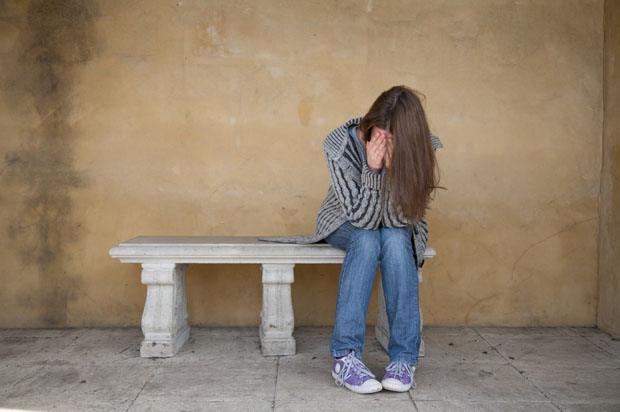Miscarriage: the emotions
However old you are, losing a baby can be a distressing, confusing and lonely experience.

Going through a miscarriage can create lots of emotions.
Whether you and your partner have been trying for a baby for months, or you fell pregnant after a one-night stand, there’s no standard response to miscarriage and no ‘correct’ way to grieve.
“Miscarriage can happen to women of any age,” says Ruth Bender Atik, National Director of The Miscarriage Association. “Everyone is different and has their own way of coping. If a woman has miscarried a baby who was very much wanted, it can be a tremendous loss. On the other hand, we hear some people saying, ‘I wasn’t trying to get pregnant, I was even thinking of having a termination’, who are just as devastated. Sometimes it’s only when you have a miscarriage that you realise how much you wanted the baby.”
Double shock
Zoe was 19 and had just started university when she found out she was pregnant by Mark, her boyfriend of two weeks. “I was caught up in a whirlwind romance and was stunned when I got pregnant – but not as stunned as my parents who considered it completely irresponsible and out of character,” she says. “They assumed I’d have an abortion and get on with my life, but I was surprised by how hostile I felt about this. The bond I felt for this unborn child inside me knocked me sideways and I felt blessed that I was becoming a mother.”
Mark said he wasn’t ready to become a dad and he and Zoe had several arguments before splitting up. A month later, 11 weeks into her pregnancy, Zoe started bleeding and was told that she’d had a miscarriage. “I was numb with grief for at least a week,” says Zoe. “I felt dizzy, empty and alone – it was as if the life had been scooped out of me. I became obsessed that by arguing with Mark, I’d caused my baby extra stress in the early stage of its life and I was to blame. I was angry at Mark, who was openly relieved I’d lost the baby, as were my family.
“My Mum even said this was the best situation all round – I found this so hurtful that I cut myself off from my family. It was only by talking to friends, calling The Miscarriage Assocation helpline, and writing my thoughts down that I could come to terms with what happened. It still took a year before I could see a mother and baby on the street without wanting to cry.”
Feelings
Common feelings experienced by those who have miscarried include:
- Shock;
- Confusion;
- Sadness and regret;
- Loneliness;
- Guilt;
- Tiredness;
- Anger;
- Jealousy.
It’s also worth mentioning that some people don’t consider a miscarriage a major event and prefer to put the experience behind them, giving it little thought. Any individual reaction ranging from acceptance to intense grief is normal and should be respected.
Trying again
If you’re eager to get pregnant, you might be wondering when it’s best to start trying again, and that if you do this too quickly, will you be at risk of another miscarriage? “While you should not have sex while you continue to bleed (because of risk of infection), it is safe to start trying as soon as you both feel emotionally and physically ready,” says Ruth.
Finding support
Men’s feelings surrounding the loss of a baby are often ignored, but they have lost a baby too, so it’s important their feelings are recognised. It’s good to talk your grief through with friends or family as well as with organisations that can offer you specialist, confidential support and information. Ruth says: “Younger women often tell us that friends or family have said: ‘It’s probably for the best’ or, ‘You’re only young, you can always try again’. Some people find this comforting, but others are upset by it. Often the best thing to say is: ‘I’m sorry you’ve lost your baby’.”
Marking your loss
Women and couples who have miscarried in the later stages of pregnancy may choose to have a funeral or cremation service, and some hospitals hold remembrance services for loss at any stage.
Never forget
Many people find it helps to give their lost baby a name. This doesn’t have to be a proper name, it might even be something like ‘Peanut’ or ‘Titch’, but the act of naming means women who have miscarried – and perhaps did not know the sex of their baby, as is often the case – don’t have to refer to him or her as ‘it’, which can feel impersonal and upsetting.
If there is a photo from the baby’s first scan, you may want to keep this in a treasured place as a special way of remembering your baby, perhaps on the due date or the anniversary of the loss. Often doing or making something, such as a memorial, can help you and your partner work through your feelings. Keeping a journal, or collecting up the items already bought for the baby, and storing them lovingly is one way of doing this. Most women say they will never forget the child they have lost, but finding a way of actively remembering and acknowledging him or her can help ease the pain.
Photo of a girl on a bench by Shutterstock.
Next Steps
- Chat about this subject on our Discussion Boards.
By Liz Nicholls
Updated on 26-Jan-2023
No featured article














